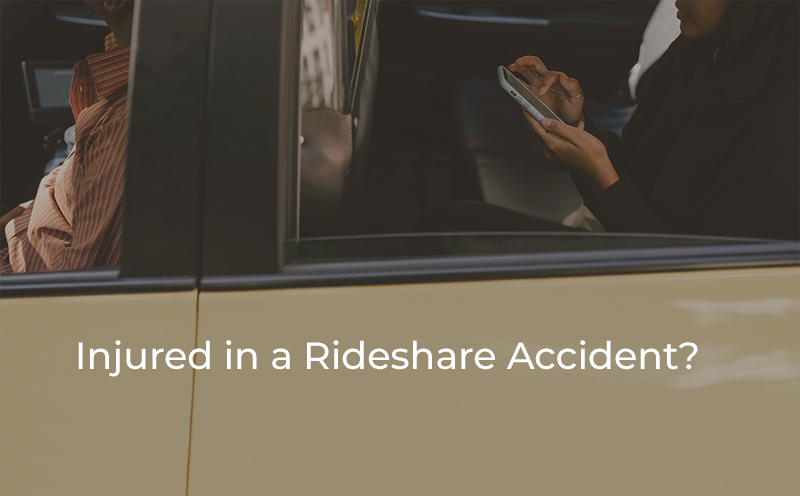Injured in a Rideshare Accident – No-Fault Benefits, Liability Claims

Rideshares – such as Uber and Lyft – are a popular way to get from point A to point B without the hassle and maintenance of owning your own vehicle. But in the unfortunate instance of becoming injured as a result of a rideshare crash, many people don’t know if they can obtain insurance benefits or where to turn for those benefits. Here to help those injured in a rideshare accident understand their rights to no-fault benefits and a potential liability claim, Grand Rapids car crash lawyer, Tom Sinas, covered this timely and important topic recently on Fox 17 “Know the Law.” If you’re a passenger injured in a rideshare vehicle, this article will answer many of your questions.
Can Passengers Injured in a Rideshare Accident Receive No-Fault Benefits?
The short answer is – yes! You can still receive auto no-fault benefits even if you were injured as a passenger of a rideshare vehicle. The Michigan Auto No-Fault Act determines a person’s eligibility for no-fault benefits based on a fairly simple concept. If you were injured as the result of the use, maintenance, or operation of a motor vehicle you are entitled to these benefits. Therefore, injuries sustained by passengers in a rideshare vehicle accident fall within the requirement standards for no-fault benefits.
It’s important to remember everything our state’s auto no-fault benefits encompass and pay for, including medical expenses and lost wages. You can learn more about the specifics of our auto no-fault benefits here. Injuries as a result of a collision in a rideshare vehicle entitle you to the wide range of benefits provided by our state’s no-fault system.
Changes to No-Fault Impact Rideshare Passengers
There have been recent significant changes to the no-fault law and these changes do impact rideshare passengers in terms of where to turn for insurance benefits and how much is available in benefits to these individuals. One of the most significant recent changes to the no-fault system is a person or company’s ability to choose different levels of no-fault coverage. Because of this change, rideshare passengers must determine where to obtain no-fault benefits from by answering the following:
Do you have your own auto no-fault policy or do you live with a relative who has a no-fault policy?
YES: If you have your own auto no-fault policy, or you live with a relative who has a no-fault policy, you will turn to this policy for your auto no-fault benefits.
NO: If you do not have your own auto no-fault policy or are not domiciled with a family who has a no-fault policy, you will turn to the auto insurance of the rideshare vehicle you were occupying at the time of the accident.
As mentioned previously, the main component of the new no-fault system is “choice” in regard to no-fault coverage levels. If you or a family member with whom you are domiciled has a no-fault policy and that policy has unlimited medical coverage, you will be able to access those unlimited benefits if you’re injured as a passenger in a rideshare accident. However, if you do not have your own auto no-fault policy (or through a family member with whom you live) and must turn to the insurer of the rideshare vehicle, you may only be eligible to receive capped no-fault benefits. The monetary cap on benefits depends on the level of coverage selected by whoever insured the rideshare vehicle. The level of benefits available in this instance is beyond the passenger’s control.
Can I Pursue a Liability Claim Against a Rideshare Driver?
Some people injured in motor vehicle accidents may be able to pursue a second and entirely separate claim from a claim for no-fault benefits. This second claim is commonly known as an auto liability, auto negligence, or tort claim. While no-fault claims compensate for no-fault benefits only, the liability claim compensates injured people for damages above and beyond what no-fault covers, such as:
- Wages lost if you cannot return to work after 3 years due to your injuries
- Excess economic damages exceeding what is payable through auto no-fault
- Medical expenses incurred above the level of no-fault benefits you are entitled to
- Quality of life damages, such as pain and suffering
Who is Liable for Rideshare Accident Injuries?
In order to pursue a no-fault benefit, you don’t have to establish anything other than the fact that you were injured in a motor vehicle accident. Claims for no-fault benefits do not factor in wrongdoing. This is not the case for the liability claim. In order to pursue a liability claim, you must establish that someone else was negligent and their negligence caused your injuries. Negligence simply means a “failure to use reasonable care.”
So, if you are injured in a rideshare accident, you must determine whether or not you are eligible to pursue a liability claim and which driver failed to use reasonable care. The driver of the rideshare or the driver of the other vehicle (sometimes both) could be responsible for the collision. Passengers of rideshares are almost never at fault. Once liability is established, an analysis of fault must be conducted, as well as a determination regarding the various insurance policies involved. This process quickly becomes fairly complex and often requires the assistance of a skilled and experienced Michigan auto accident attorney.
RELATED READING:
Do I Still Get Michigan No-Fault Benefits if I Was in Car Accident in Another State?
Out-Of-State Drivers Involved in Michigan Accidents: Impacts of the Recent No-Fault Reform
Injured in a Rideshare Accident – No-Fault Benefits, Liability Claims

